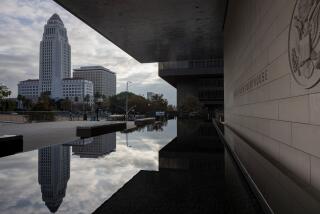U.S. to Take Lead in ‘Whistle-Blower’ Suit Against Litton
- Share via
The Justice Department disclosed Wednesday that it will take over prosecution of a private “whistle-blower” lawsuit accusing a Litton Industries subsidiary of overcharging the government by at least $25 million for computer work on hundreds of defense contracts.
The lawsuit, ordered unsealed Wednesday by U.S. District Judge Matthew M. Byrne Jr. in Los Angeles, accuses the company’s Woodland Hills computer division of boosting charges to the government for computer time so it could charge commercial customers less.
Lawyers representing the former Litton data systems analyst who initially filed the suit, James Carton of Moorpark, said the suit could make the company liable for hundreds of millions of dollars in damages.
Justice Department lawyers declined to comment on the case, but in court papers unsealed Wednesday, the U.S. attorney’s office in Los Angeles said the government has completed its investigation of Carton’s allegations and has elected to “assume primary responsibility for prosecuting the action.”
Litton, one of the nation’s leading suppliers of defense electronics equipment, said there is no truth to any of the allegations and said the company had in fact saved the government money by sharing computer time with commercial customers.
Claims Money Saved
“We’re aware of the general allegations being made, and what we would like to say is that in fact the exact opposite is true,” said company spokesman John Thom. “There’s been no overcharging. In fact, there’s been substantial reduction in costs for the data processing services that division charges. We’ve been saving American taxpayers literally millions of dollars by selling to commercial customers.”
Under the federal False Claims Act, private citizens like Carton who believe they have evidence of wrongdoing against the government are allowed to file lawsuits that are kept under seal until the government investigates the allegations. If the government decides there is merit to the case, it can elect to take over the lawsuit and share a portion of any damages collected with the original “whistle-blower.”
“It’s precisely the kind of case that the False Claims Act was designed to unearth,” said John Phillips, one of the lawyers representing Carton. “No government auditor would have turned this up, regardless of how careful and thorough they were.”
The lawsuit alleges that Litton, apparently in an attempt to attract more commercial computer customers, did not charge commercial clients for using Litton’s computer memory banks beyond a certain “cap” level.
Government Clients
There were no such “caps” for government contract clients, however, and the government has ended up paying the excess overhead for commercial customers, the suit alleges.
Carton, 46, said in an interview that he discovered the problem when he was asked as technical director of the Woodland Hills division to do a profitability study of the company’s computer clients.
Carton said he discovered within a few days that there was no way to determine how much profit Litton derived from each customer because the accounting system between government and commercial clients was so intertwined. “I was deep into the bowels of the software that runs the machine, and I was apparently touching some nerves,” he said.
Carton said he confronted his superiors with his findings--that the government was clearly being overcharged for computer services--but got no response.
Phillips said he believes that Litton officials deliberately designed the accounting system to pass excess costs to the government. “It was conscious, it was deliberate, it was planned, and they were reaping the benefits of it all along,” he said.
Lawsuit Initiated
Carton filed the lawsuit about a year after he left the company on friendly terms in 1987. But he continued to work as a consultant for Litton and believes that the company has continued to mischarge the government.
Litton officials declined to discuss details of the company’s accounting system, and also declined to say what proportion of the company’s computer customers are commercial clients.
But Thom did say that sharing computer time between government and private customers allowed for economies of scale that were passed off in the form of savings to the government.
“We’re stunned by the fact that we would get sued over such a matter, when we’re saving the government money,” he said.
More to Read
Sign up for Essential California
The most important California stories and recommendations in your inbox every morning.
You may occasionally receive promotional content from the Los Angeles Times.












